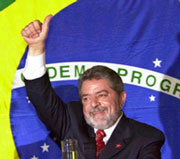In today's edition, Sept, 21,the British agency Reuters published the following article:
Brazil's Lula is savior in Native Northeast
 A woman emerges from the thick scrub with a bundle of firewood on her back and walks down a dirt path to her small farm in Caetes, a poor and remote district in northeast Brazil.
A woman emerges from the thick scrub with a bundle of firewood on her back and walks down a dirt path to her small farm in Caetes, a poor and remote district in northeast Brazil.
Electricity lines run to the simple house and a satellite dish sits on the roof -- luxuries that were unimaginable in Caetes when Luiz Inacio Lula da Silva started 52 years ago on his voyage from here to Brazil's presidency.
The wood-gatherer is Corina Guilermine da Silva, Lula's 75-year-old aunt. She still lives off the land.As chickens cluck and bean plants dry on the walls of her house, Corina says she never thought of migrating to Brazil's south like so many from Lula's family and the northeast region did.
As a poor son of the north, who struggled through childhood selling peanuts and shining shoes before rising up to become a union leader in Sao Paulo, Lula epitomizes the hopes of northeasterners who want a better life. He struck a unique chord, promising three meals for all Brazilians through the "Zero Hunger" plan he launched in his 2002 campaign.
"It's in Lula's heart to rescue the northeast," says Lula's second cousin, Heraldo Ferreira, who is standing in the Oct 3 elections for councilor of the area's biggest town, Garanhuns.
Many locals say there have been no concrete improvements since Lula's election and the strong economic growth in some parts of Brazil have yet to reach this area, which is dominated by the production of farm goods like chickens, milk and beans.
Unemployment is high and the main road leading to the town of Garanhuns is a potholed, muddy unpaved track in some places.
During his first year in power he enacted tough budget cuts, which led to the first contraction of Brazil's economy in more than a decade and dampened the hopes that Lula could make a difference.His bet paid off and the economy is now growing briskly.
The test for his Workers' Party in these elections, the results of which could be indicative of Lula's chances to be re-elected in 2006, is to prove that improvements in people's lives can materialize everywhere in the world's fifth most populous country.
"This country is a continent, things don't happen at the same time, at the same pace, everywhere," says Ferreira, who is running for the Workers' Party.
"The Workers' Party delivered hope, people still have hope, but it has not translated into anything practical in the periphery of Brazil, in all the corners of the country," he added.
Jose Moura di Mello, another second cousin of Lula, says a concern is that the federal government's poverty-reduction schemes are not working properly.
"Zero Hunger is distributing lots of government money to lots of layabouts, lots of people who don't need it," he says.
"I was raised here, so I stayed here," she says.
But even if Lula left long ago, his presence in the region is strong. According to relatives involved in local politics, the area's future is inextricably linked to the fortunes of Brazil's first working-class president.
That could not be more true a few weeks before the first nationwide elections, for city mayors and councilors, since Lula won a presidential vote in 2002 after three failed bids.
Seen from the windy fields where Lula was born, it is easy to understand why he is passionate about fighting Brazil's gaping inequality, which is played out above all by huge regional differences between the rich south and poor north.
A visitor to this part of Pernambuco state, on a cool mountain plateau about 155 miles from the lush, forested coastline, sees plenty of rural hardship.
There are water shortages, poor soil and some farmers still use ox-drawn carts to take farm goods to market. That is a far cry from the soccer games and soap operas about the lives of the rich in Sao Paulo that beam down to local television sets by satellite.
______________